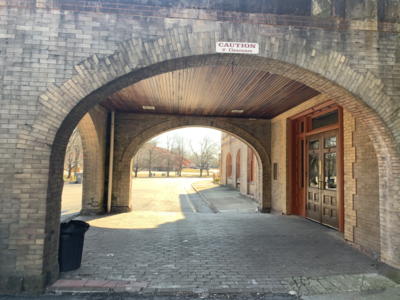Youngstown station (Baltimore and Ohio Railroad)
Youngstown, OH | ||||||||||||||||||||||||||
|---|---|---|---|---|---|---|---|---|---|---|---|---|---|---|---|---|---|---|---|---|---|---|---|---|---|---|
 B&O station, March 2021 | ||||||||||||||||||||||||||
| Location | 530 Mahoning Avenue Youngstown, Ohio | |||||||||||||||||||||||||
| Coordinates | 41°06′10″N 80°39′30″W / 41.10273°N 80.65830°WCoordinates: 41°06′10″N 80°39′30″W / 41.10273°N 80.65830°W | |||||||||||||||||||||||||
| Line(s) | CSX New Castle Subdivision | |||||||||||||||||||||||||
| Other information | ||||||||||||||||||||||||||
| Website | http://banquetatthebno.com | |||||||||||||||||||||||||
| History | ||||||||||||||||||||||||||
| Opened | 1905 November 10, 1990 May 16, 1997 | |||||||||||||||||||||||||
| Closed | 1971 September 10, 1995 March 7, 2005 | |||||||||||||||||||||||||
| Former services | ||||||||||||||||||||||||||
| ||||||||||||||||||||||||||
Baltimore & Ohio Railroad Terminal | ||||||||||||||||||||||||||
| Architectural style | Colonial Revival | |||||||||||||||||||||||||
| NRHP reference No. | 86001565[1] | |||||||||||||||||||||||||
| Added to NRHP | July 10, 1986 | |||||||||||||||||||||||||
Youngstown is a former passenger railroad station in Youngstown, Ohio. The station is on the ex Baltimore and Ohio Railroad, and was a B&O passenger station for most of the twentieth century. The station was built in 1905 and operated as a passenger station until 1971, when the B&O yielded passenger train service to Amtrak.[2][3] It was later a passenger station for Amtrak through the 1990s and early 2000s.
History[]

The station was built in 1905 at the cost of $70,000. It was located on the southern banks of the Mahoning River. This was in contrast to competing stations of the Erie, New York Central and Pennsylvania railroads located in the city's downtown. The B&O raised the railroad tracks to the level of the building's second floor after river flooding of the area, which reached an epic level in March 1913.[4] In 1926 the company added a freight house.[5][6][7]
Passenger trains[]
The B&O's famed Capitol Limited ran through the city, but it did not stop there until later years. Noted passenger trains at 1956 included:[8]
- Ambassador - Detroit - Baltimore
- Cleveland Night Express - Cleveland - Baltimore
- Washingtonian - Cleveland - Baltimore
- Columbian - Chicago - Washington, D.C.
- Shenandoah - Chicago - Jersey City
Declining years[]
The B&O terminated several trains running through Youngstown over the course of the 1960s. By 1964, the B&O had eliminated the trains to Cleveland. Detroit-bound travelers would need to transfer at Deshler for the Cincinnatian or the Night Express to Detroit.[9]
The B&O in 1964 changed the Capitol Limited to the Capitol. The renamed train began stopping at intermediate stations such as Youngstown.[10] By 1965, only this station and the Erie station on West Commerce Street remained as passenger stations in Youngstown.[11][12]
In the station's final years the station was serving the Capitol Limited (name restored) and an unnamed day train from Akron to Washington.[13] In 1971 Amtrak took over passenger train operations from the Baltimore & Ohio and this marked the end of passenger trains at the Youngstown station. All remaining rail traffic was strictly freight oriented.[14]
Legacy[]
In the mid-1980s the city bought the station building, amidst anticipation that the building would be demolished. In 1991 a restaurant took over the location.[15]
The station briefly had a renaissance in the 1990s and early 2000s. From 1990 to 1995 the station served Amtrak's Broadway Limited (Chicago-New York) on a brief rerouting of the train.[16][17] And from 1997 to 2005 the station served Amtrak's Three Rivers (Chicago-New York).[18][19][20]
Gallery[]

1991 restaurant dedication plaque

Former platform


Nearby B&O bridge (1940)
References[]
- ^ "National Register Information System". National Register of Historic Places. National Park Service. July 9, 2010.
- ^ Great Union Stations, 'Youngstown Passenger Trains of the Past' https://www.chicagorailfan.com/stbcyng.html
- ^ Camp, Mark J. 'Railroad Depots of Northeast Ohio,' Arcadia Publishing, 2007, p. 30.
- ^ Mahoning Valley Historical Society, "The Flood of 1913," March 14, 2013 https://mahoninghistory.org/2013/03/14/the-great-flood-of-1913/
- ^ Great Union Stations, 'Youngstown Passenger Trains of the Past' https://www.chicagorailfan.com/stbcyng.html
- ^ "Index of Railroad Stations, 1470". Official Guide of the Railways. National Railway Publication Company. 54 (1). June 1921.
- ^ Camp, Mark J. 'Railroad Depots of Northeast Ohio,' Arcadia Publishing, 2007, p. 30.
- ^ "Baltimore & Ohio Road, Table 13". Official Guide of the Railways. National Railway Publication Company. 89 (5). October 1956.
- ^ "Baltimore & Ohio Road, Table 1". Official Guide of the Railways. National Railway Publication Company. 97 (7). December 1964.
- ^ "Baltimore & Ohio Road, Table 1". Official Guide of the Railways. National Railway Publication Company. 97 (7). December 1964.
- ^ Great Union Stations, 'Youngstown Passenger Trains of the Past' https://www.chicagorailfan.com/stbcyng.html
- ^ "Index of Railroad Stations". Official Guide of the Railways. National Railway Publication Company. 98 (2). July 1965.
- ^ "Baltimore & Ohio Road, Table 1". Official Guide of the Railways. National Railway Publication Company. 102 (12). May 1970.
- ^ Camp, Mark J. 'Railroad Depots of Northeast Ohio,' Arcadia Publishing, 2007, p. 30.
- ^ Camp, Mark J. 'Railroad Depots of Northeast Ohio,' Arcadia Publishing, 2007, p. 30.
- ^ Amtrak timetable, April 7, 1991, 50
- ^ Amtrak timetable, October 29, 1995, struck from table
- ^ Sanders, Craig (2006). Amtrak in the Heartland. Bloomington, Indiana: Indiana University Press. ISBN 978-0-253-34705-3.
- ^ Amtrak timetable, May 11, 1997, 26
- ^ Amtrak timetable, April 25, 2005, struck from table
| Wikimedia Commons has media related to Youngstown Baltimore and Ohio Railroad Station. |
- Former Baltimore and Ohio Railroad stations
- Railway stations in the United States opened in 1905
- Railway stations closed in 1971
- Former railway stations in Ohio
- Former Amtrak stations in Ohio
- Railway stations in the United States opened in 1990
- Railway stations in the United States opened in 1997
- Railway stations closed in 1995
- Railway stations closed in 2005
- National Register of Historic Places in Mahoning County, Ohio




